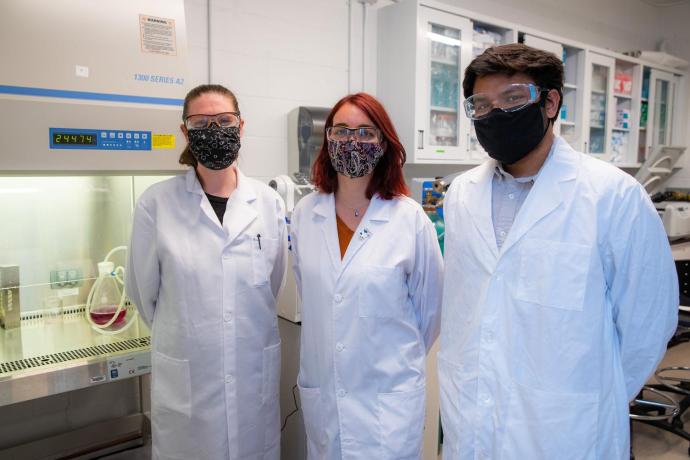Breast Cancer Chemotherapy Method Wins GSA Research Showcase

NJIT's annual Graduate Student Association Research Day returned to the campus this week, after being cancelled last year because of COVID, with 39 students who are pursuing doctoral and master's degrees showcasing their cutting-edge research on topics such as the pandemic, climate, transportation and cybersecurity.
The winner was Aida Lopez Ruiz, a chemical engineering doctoral student from Spain, who is helping breast cancer patients by putting chemotherapy drugs inside microscopic bits of platinum which only become toxic when they reach tumors. That way the drugs do not harm healthy cells, she explained.
Ruiz said her method will be tested on mice next year. She's working with Assistant Professor Kathleen McEnnis and undergraduate student Ashish Kokkula, who is also part of Albert Dorman Honors College.
Ruiz and other winners took home funds intended for traveling to conferences and purchasing research equipment.
In total, there were 23 projects from Newark College of Engineering, seven from Ying Wu College of Computing, six from the College of Science and Liberal Arts, two from Martin Tuchman School of Management and one from Hillier College of Architecture and Design. Many projects involved multiple students.
The event also featured a keynote speech by Princeton University Professor Robert Prud'homme who helped develop the science for scaling up COVID vaccines.
"The message today was describing the science and engineering that went into making lipid nanoparticles like the COVID vaccines," Prud'homme said. "Our contribution to that was developing the precipitation technology to create the lipid nanoparticles. I just wanted to go through the history of the development of that. It took years to do. Moderna, by the time they got the molecular sequencing of the spike protein, it was only 54 days for them to make the mRNA for starting trials. Our role was in the technology that allows them to go 270 million doses."
Clarisa Gonzalez-Lenahan, director of graduate studies, said there are about 4,000 graduate students at NJIT. Her office is planning a new event for next spring where students will give three-minute presentations, with the challenge of concisely and clearly explaining their research.
"It doesn't matter if you invented the best thing next to sliced bread if you can't talk about it," she noted. "You not only need to be a good communicator, you need to be a good listener, because you have to be able to hear people from all different environments and you have to be able to work with them."


